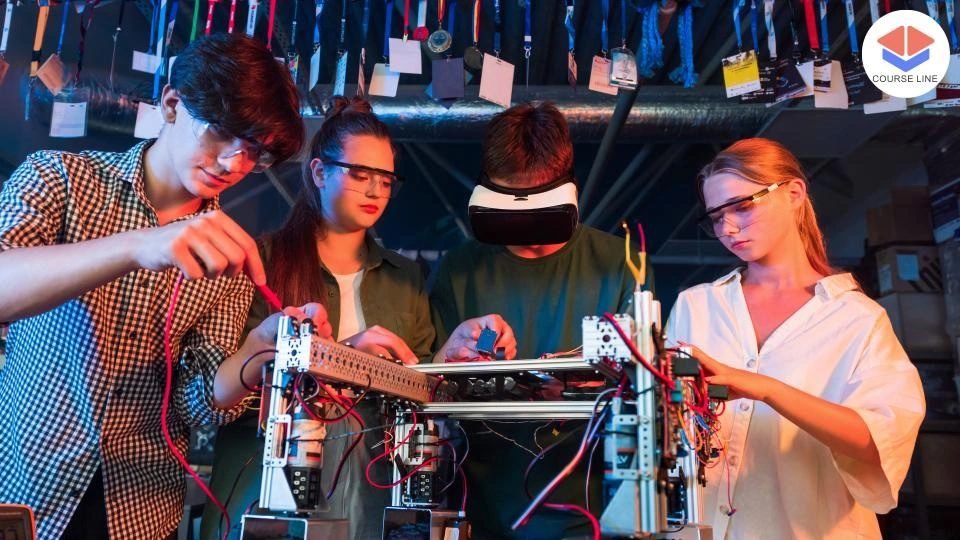Course Features
Price
Study Method
Online | Self-paced
Course Format
Reading Material - PDF, article
Duration
6 hours, 5 minutes
Qualification
No formal qualification
Certificate
At completion
Additional info
Coming soon
- Share
Overview
Biomedical Engineering integrates engineering principles with medical and biological sciences to design and develop medical devices, diagnostic tools, and healthcare innovations. The Biomedical Engineering Level 5 Advanced Diploma provides a comprehensive foundation in medical instrumentation, biomaterials, biomechanics, and imaging technologies, alongside regulatory frameworks essential for the industry.
The course begins with Medical Instrumentation, where students explore bioelectric signal measurement, medical sensors, transducers, and diagnostic imaging techniques. Hands-on exercises focus on calibration and accuracy of medical instruments, ensuring learners gain practical knowledge of clinical diagnostics.
In Biomaterials, students examine the properties, classification, and biocompatibility of materials used in medical applications. They also study tissue engineering, prosthetics, and implants, with case studies demonstrating real-world biomedical material applications.
The Biomedical Imaging module covers principles of X-ray, MRI, CT, ultrasound, and image processing techniques. Students engage in practical image acquisition and analysis, learning how to interpret diagnostic images and explore emerging technologies in medical imaging.
In Biomechanics, learners explore human movement, musculoskeletal dynamics, and the mechanics of artificial limbs and orthopedic devices. This module also includes a project on designing and testing rehabilitation devices, providing hands-on experience in assistive technology.
A key component of the course is Regulatory Affairs and Quality Management, where students study medical device regulations, quality management systems (ISO 13485, FDA), risk management, and ethical considerations. Industry professionals provide guest lectures on compliance and quality assurance, preparing students for real-world biomedical engineering careers.
The course concludes with Advanced Topics in Biomedical Engineering, covering nanotechnology in medicine, biomedical signal processing, wearable medical devices, and artificial intelligence in healthcare. Learners gain insight into emerging innovations, challenges, and future directions in the field.
Who is this course for?
Biomedical Engineering integrates engineering principles with medical and biological sciences to design and develop medical devices, diagnostic tools, and healthcare innovations. The Biomedical Engineering Level 5 Advanced Diploma provides a comprehensive foundation in medical instrumentation, biomaterials, biomechanics, and imaging technologies, alongside regulatory frameworks essential for the industry.
The course begins with Medical Instrumentation, where students explore bioelectric signal measurement, medical sensors, transducers, and diagnostic imaging techniques. Hands-on exercises focus on calibration and accuracy of medical instruments, ensuring learners gain practical knowledge of clinical diagnostics.
In Biomaterials, students examine the properties, classification, and biocompatibility of materials used in medical applications. They also study tissue engineering, prosthetics, and implants, with case studies demonstrating real-world biomedical material applications.
The Biomedical Imaging module covers principles of X-ray, MRI, CT, ultrasound, and image processing techniques. Students engage in practical image acquisition and analysis, learning how to interpret diagnostic images and explore emerging technologies in medical imaging.
In Biomechanics, learners explore human movement, musculoskeletal dynamics, and the mechanics of artificial limbs and orthopedic devices. This module also includes a project on designing and testing rehabilitation devices, providing hands-on experience in assistive technology.
A key component of the course is Regulatory Affairs and Quality Management, where students study medical device regulations, quality management systems (ISO 13485, FDA), risk management, and ethical considerations. Industry professionals provide guest lectures on compliance and quality assurance, preparing students for real-world biomedical engineering careers.
The course concludes with Advanced Topics in Biomedical Engineering, covering nanotechnology in medicine, biomedical signal processing, wearable medical devices, and artificial intelligence in healthcare. Learners gain insight into emerging innovations, challenges, and future directions in the field.
Requirements
Biomedical Engineering integrates engineering principles with medical and biological sciences to design and develop medical devices, diagnostic tools, and healthcare innovations. The Biomedical Engineering Level 5 Advanced Diploma provides a comprehensive foundation in medical instrumentation, biomaterials, biomechanics, and imaging technologies, alongside regulatory frameworks essential for the industry.
The course begins with Medical Instrumentation, where students explore bioelectric signal measurement, medical sensors, transducers, and diagnostic imaging techniques. Hands-on exercises focus on calibration and accuracy of medical instruments, ensuring learners gain practical knowledge of clinical diagnostics.
In Biomaterials, students examine the properties, classification, and biocompatibility of materials used in medical applications. They also study tissue engineering, prosthetics, and implants, with case studies demonstrating real-world biomedical material applications.
The Biomedical Imaging module covers principles of X-ray, MRI, CT, ultrasound, and image processing techniques. Students engage in practical image acquisition and analysis, learning how to interpret diagnostic images and explore emerging technologies in medical imaging.
In Biomechanics, learners explore human movement, musculoskeletal dynamics, and the mechanics of artificial limbs and orthopedic devices. This module also includes a project on designing and testing rehabilitation devices, providing hands-on experience in assistive technology.
A key component of the course is Regulatory Affairs and Quality Management, where students study medical device regulations, quality management systems (ISO 13485, FDA), risk management, and ethical considerations. Industry professionals provide guest lectures on compliance and quality assurance, preparing students for real-world biomedical engineering careers.
The course concludes with Advanced Topics in Biomedical Engineering, covering nanotechnology in medicine, biomedical signal processing, wearable medical devices, and artificial intelligence in healthcare. Learners gain insight into emerging innovations, challenges, and future directions in the field.
Career path
Biomedical Engineering integrates engineering principles with medical and biological sciences to design and develop medical devices, diagnostic tools, and healthcare innovations. The Biomedical Engineering Level 5 Advanced Diploma provides a comprehensive foundation in medical instrumentation, biomaterials, biomechanics, and imaging technologies, alongside regulatory frameworks essential for the industry.
The course begins with Medical Instrumentation, where students explore bioelectric signal measurement, medical sensors, transducers, and diagnostic imaging techniques. Hands-on exercises focus on calibration and accuracy of medical instruments, ensuring learners gain practical knowledge of clinical diagnostics.
In Biomaterials, students examine the properties, classification, and biocompatibility of materials used in medical applications. They also study tissue engineering, prosthetics, and implants, with case studies demonstrating real-world biomedical material applications.
The Biomedical Imaging module covers principles of X-ray, MRI, CT, ultrasound, and image processing techniques. Students engage in practical image acquisition and analysis, learning how to interpret diagnostic images and explore emerging technologies in medical imaging.
In Biomechanics, learners explore human movement, musculoskeletal dynamics, and the mechanics of artificial limbs and orthopedic devices. This module also includes a project on designing and testing rehabilitation devices, providing hands-on experience in assistive technology.
A key component of the course is Regulatory Affairs and Quality Management, where students study medical device regulations, quality management systems (ISO 13485, FDA), risk management, and ethical considerations. Industry professionals provide guest lectures on compliance and quality assurance, preparing students for real-world biomedical engineering careers.
The course concludes with Advanced Topics in Biomedical Engineering, covering nanotechnology in medicine, biomedical signal processing, wearable medical devices, and artificial intelligence in healthcare. Learners gain insight into emerging innovations, challenges, and future directions in the field.
-
- Introduction to medical instrumentation 00:10:00
- Sensors and transducers in biomedical applications 00:10:00
- Bioelectric signals and their measurement 00:10:00
- Imaging techniques in medical diagnostics 00:10:00
- Laboratory exercises: Calibration of medical instruments 00:10:00
-
- Properties and classification of biomaterials 00:10:00
- Biocompatibility and biodegradation 00:10:00
- Tissue engineering and regenerative medicine 00:10:00
- Biomaterials in prosthetics and implants 00:10:00
- Case study: Design and evaluation of biomaterials for specific medical 00:10:00
- Principles of medical imaging modalities 00:10:00
- Image processing techniques in biomedical imaging 00:10:00
- Clinical applications and diagnostic interpretation 00:10:00
- Emerging trends in biomedical imaging technology 00:10:00
- Practical session: Image acquisition and analysis using software tools 00:10:00
- Regulatory framework for medical devices and equipment 00:10:00
- Quality management systems (ISO 13485, FDA regulations, etc.) 00:10:00
- Risk management and documentation requirements 00:10:00
- Ethical considerations in biomedical engineering research 00:10:00
- Guest lecture: Industry perspective on regulatory compliance 00:10:00
- Exam of Biomedical Engineering Level 5 Advanced Diploma 00:50:00

No Reviews found for this course.
Is this certificate recognized?
Yes, our premium certificate and transcript are widely recognized and accepted by embassies worldwide, particularly by the UK embassy. This adds credibility to your qualification and enhances its value for professional and academic purposes.
I am a beginner. Is this course suitable for me?
Yes, this course is designed for learners of all levels, including beginners. The content is structured to provide step-by-step guidance, ensuring that even those with no prior experience can follow along and gain valuable knowledge.
I am a professional. Is this course suitable for me?
Yes, professionals will also benefit from this course. It covers advanced concepts, practical applications, and industry insights that can help enhance existing skills and knowledge. Whether you are looking to refine your expertise or expand your qualifications, this course provides valuable learning.
Does this course have an expiry date?
No, you have lifetime access to the course. Once enrolled, you can revisit the materials at any time as long as the course remains available. Additionally, we regularly update our content to ensure it stays relevant and up to date.
How do I claim my free certificate?
I trust you’re in good health. Your free certificate can be located in the Achievement section. The option to purchase a CPD certificate is available but entirely optional, and you may choose to skip it. Please be aware that it’s crucial to click the “Complete” button to ensure the certificate is generated, as this process is entirely automated.
Does this course have assessments and assignments?
Yes, the course includes both assessments and assignments. Your final marks will be determined by a combination of 20% from assignments and 80% from assessments. These evaluations are designed to test your understanding and ensure you have grasped the key concepts effectively.
Is this course accredited?
We are a recognized course provider with CPD, UKRLP, and AOHT membership. The logos of these accreditation bodies will be featured on your premium certificate and transcript, ensuring credibility and professional recognition.
Will I receive a certificate upon completion?
Yes, you will receive a free digital certificate automatically once you complete the course. If you would like a premium CPD-accredited certificate, either in digital or physical format, you can upgrade for a small fee.
Course Features
Price
Study Method
Online | Self-paced
Course Format
Reading Material - PDF, article
Duration
6 hours, 5 minutes
Qualification
No formal qualification
Certificate
At completion
Additional info
Coming soon
- Share
Physiotherapy Assistant Level 3 Advanced Diploma
Course Line239£490.00Original price was: £490.00.£14.99Current price is: £14.99.Gamekeeping in the 21st Century: Modern Tools and Techniques
Course Line238£490.00Original price was: £490.00.£14.99Current price is: £14.99.Brand Ambassador Level 3 Advanced Diploma
Course Line237£490.00Original price was: £490.00.£14.99Current price is: £14.99.





